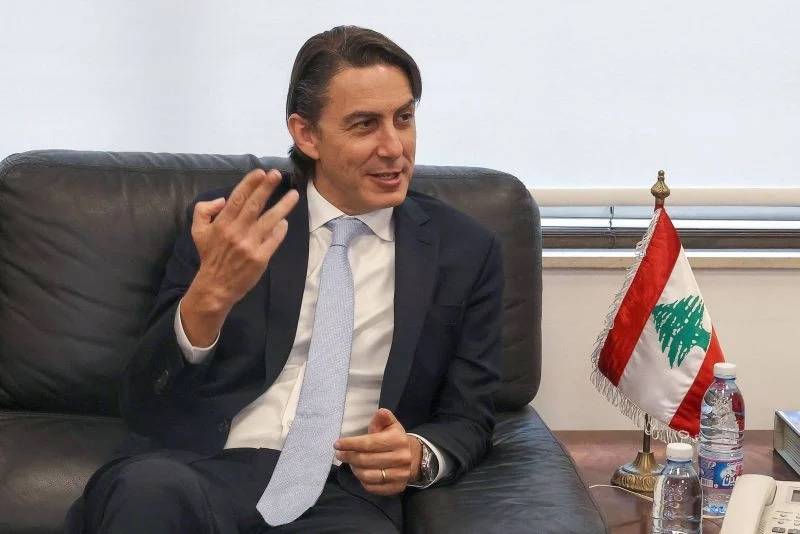
US envoy Amos Hochstein upon his arrival in Beirut earlier this week, during his meeting with Energy Minister Walid Fayad. (Anwar Amro/AFP)
It was only by chance that caretaker Energy Minister Walid Fayad and US energy envoy Amos Hochstein met on Sunday, on the same plane coming from Athens to Beirut.
The two men reportedly had cordial discussions while waiting for their official meeting scheduled for a few hours later at the Energy Ministry headquarters. The meeting had to be postponed by almost an hour due to a flight delay.
The two men have had regular meetings during each of the US envoy’s visits to Lebanon since last year. Why does Hochstein insist on seeing Fayad every time?
The answer is likely twofold: First is the import of gas from Egypt and electricity from Jordan to enable Electricite Du Liban to increase power supply hours to all areas of Lebanon, and secondly is US negotiator’s interest in the energy deals between the states.
As soon as he was appointed head of the Energy Ministry in September, Fayad began contacting his Egyptian, Jordanian and Syrian counterparts to work out the necessary procedures to bring gas from Egypt and electricity from Jordan.
These formalities have been completed in recent months, with deals for Lebanon to pay low prices for the utilities, but they have yet to be implemented. The reasons provided are multiple and sometimes contradictory.
Hochstein and Fayad discussed the topic on Sunday in the presence of US Ambassador Dorothy Shea. It should be noted that for months, each time Lebanon takes a step forward in this file, new hurdles appear, to the point that media outlets close to Hezbollah have begun to suggest there may be hidden American conditions to link the issue of the energy imports to that of the maritime border delineation.
Parliament Speaker Nabih Berri said on Saturday that the Americans are not responsible for the delay in this file, which he added was due to internal administrative and political machinery, but suspicions of American obstructions remain. That is particularly true with the World Banks’ new conditions, imposed on the Lebanese government before the latter receives a planned financial assistance package.
According to sources close to the Energy Ministry, these new conditions are reasonable, but external influence remains possible.
Fayad has reportedly communicated to Hochstein these two new conditions, which can be summarized as follows: first, raise electricity tariffs, and second, to embark on the formation of a regulatory body to oversee relations between the public and private sectors.
According to World Bank representatives, these two conditions were added to further guarantee that the sums it intends to give to Lebanon will be recovered.
The World Bank considers the current electricity tariffs ridiculously low, while kicking off the formation of the regulatory body will give greater confidence to foreign investors in Lebanon’s ability to repay the loans it will be granted.
Sources close to the minister added that Fayad deliberately raised these issues with the US envoy, seeking his assistance.
From Fayad’s standpoint, it is important that this file remains a topic of discussion with the American interlocutors, even if it is not directly related to the maritime border delimitation. His goal is to make sure that the issue of the Egyptian gas and Jordanian electricity is moving forward.
During this encounter, Hochstein reportedly acknowledged that the two new conditions complicate the situation at a critical time for Lebanon. He reportedly promised to discuss them with World Bank representatives in the US in a bid to ease them, particularly since they are very difficult to meet at present.
First of all, when it comes to raising tariffs, the consent of all members of EDL’s board of directors is necessary. The board currently consists of four members instead of the usual six. Given the composition of this board, it is difficult for all members to agree on such an unpopular decision. Moreover, once the decision is made, it must also be approved by the finance minister.
Formation of the regulatory body has been a contentious issue for years. Ideally, this body is intended to oversee public and private sector relations, including private parties investing in the energy sector.
At the moment, there is no such body, and therefore this issue is not as urgent as perhaps suggested. But some parties, for political reasons, would like to expand the power of this body in a way that makes it more powerful than the Energy Ministry.
For example, there is talk of giving this body the task of developing the electricity plan, which is the ministry’s responsibility.
In this vein, it seems difficult for Lebanon to quickly meet the World Bank’s two conditions, seeing as the process involves three stages: the negotiations with the World Bank, the necessary approvals and the actual payment.
However, the imposition of these conditions now, while we are still in the first stage, suggests that the World Bank is putting pressure on Lebanon to comply.
Fayad has therefore sought the assistance of the US envoy in a likely bid to have the deadlines pushed, even if he does consider it is important to meet the two conditions.
Hochstein reportedly promised to do his best and added that in case of concrete progress in the maritime border delimitation file, his mission will be easier, opening up new prospects for Lebanon in several fields.
This article was originally published in French on L'Orient-Le Jour. Translation by Joelle El Khoury.